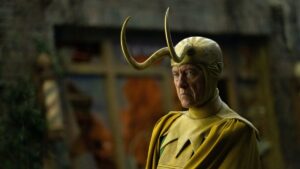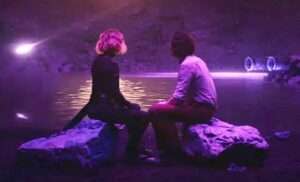SPOILERS FOR LOKI AHEAD!
Journey Into Mystery, a sci-fi anthology published by Marvel Comics from the late 1950’s into the 60’s, was where Loki got his start as a Marvel villain in 1962, starting a wild ride throughout comics, movies, and now streaming television – which makes it all the more fitting that today’s episode borrows the iconic title for what ends up being not just a journey into the very literal cosmic mystery enshrouding the origins of the Time Variance Authority and the state of the universe beyond the end of time itself, but a trippy bacchanal celebrating the character and their sprawling mythology, with its deep-seated roots in zany Marvel Comics history and the even more outrageously fantastical Norse legendarium.

This is of course only possible because last week’s episode dropped Loki (Tom Hiddleston) into a vast, desolate region of time known only as The Void – where the TVA has been secretly unloading all of the alternate timelines and Variants it claimed to have reset or “pruned”, safe in the assumption that if a couple of Variants aren’t immediately devoured by the omniaudient and omnivorous dragon which encircles The Void – perhaps a reference to the Midgard Serpent, one of Loki’s own children in Norse mythology – they will ultimately fall victim to The Void’s harsh terrain, or violent weather. The place is like a sentient meat-grinder, and out of all the billions upon billions of Variants unceremoniously dumped there since the beginning of time, it seems only Loki Variants stand a chance of surviving for very long.
And while this provides Loki with a very clever opportunity to put dozens of Loki Variants onscreen simultaneously and revel in the pure chaos that results, it also serves a larger thematic purpose: allowing Loki to witness first-hand the worst of what he’s capable of and willing to do, but showing him that it’s possible – not easy, but possible – to break the vicious cycle and change. Physically, on a surface-level, he’s done that countless times: I mean, in this very episode we become acquainted with a version of Loki who lives full-time as an Alligator, though incredibly that was not what triggered the TVA to prune them. But to be meaningful and not merely performative, real change has to happen from the inside out. And that, in a nutshell, is what Loki is all about, and that is exactly why I love this show so much.
Because it applies to both individuals and institutions, and Loki illustrates that beautifully. We watch the God of Mischief – multiple versions of them, in fact – actively work to change themselves for the better, starting with their hearts, but we also watch the same thing unfolding within the TVA, which is rotted to its core, riddled with corruption, and ultimately built on a lie. If the TVA is going to be saved, it must first be dismantled down to the bare bones and rebuilt from scratch. The easy thing to do would be to swap out leadership, to declare that Judge Ravonna Renslayer (Gugu Mbatha-Raw) is the problem, and that replacing her will magically fix everything. But she is merely the predictable symptom of a problem that has plagued the TVA since its foundation – that it is constructed on an inherently unjust guiding principle, and the longer that problem is allowed to fester, the longer the TVA will continue to cause harm.
You can probably understand why this message is so timely right now. This is the very same conversation we’ve been having about the United States of America, and the answer is the same in real-life as it is in fiction: this country is structurally unsound, and to repair it we have to begin again from the bottom up. The Falcon And The Winter Soldier tried to say something along the same lines, but ultimately lacked the conviction to demand structural change; instead going with the tried-and-true method of demanding that individuals in positions of authority do better while vilifying its characters who were trying to topple oppressive systems. Loki, on the other hand, has Mobius M. Mobius (Owen Wilson), a flawed yet undeniably heroic character, say bluntly that’s he going to burn the TVA to the ground – despite having worked there his entire life, lulled into complacency by the TVA’s propaganda machine.

And I’ll be honest with you, I don’t yet fully trust that Loki won’t drop the ball in its final episode. If Renslayer is defeated and her downfall is seen as a total victory, so that the TVA can then proceed with exactly what they were doing but it’s okay because the heroes are doing it now…yeah, I’ll be massively disappointed. But I can’t imagine that will be the case, because the show is making a big point out of the fact that the root cause of the TVA’s problems lies in its far-distant past, with its anonymous founder. The mystery of their identity is what kicks off this tumultuous episode, as Sylvie Laufeydottir (Sophia Di Martino) grills Renslayer for classified information from the TVA archives, and it’s what concludes the episode too – as Loki and Sylvie defeat The Void’s guardian dragon and catch a glimpse of what I can only describe as the French Chateau at the End of the Universe, where the Sacred Timeline ends and…something else begins.
But what makes this final sequence emotionally resonant isn’t just that Loki finally learns how to access a part of his magic that he previously didn’t know existed – although that is indeed very cool, and reminiscent of Wanda Maximoff’s triumphant metamorphosis into the Scarlet Witch at the end of WandaVision. It’s that Loki first sees another version of himself, Richard E. Grant’s Classic Loki, die to save his and Sylvie’s life from the dragon – and not because he thought helping them would work to his advantage in the long-run, not because he thought he could use it as leverage over them, but simply because he believed in them and what they were doing. That belief is what inspires Loki to fight harder than he’s ever fought in his life, because it proves unequivocally that a Loki is no more inherently evil than they are good, that his destiny is not determined, and that he can be anything – even an alligator.
I don’t know how the series will expand upon this idea in the finale, but I hope there’s still more emotional and mental growth in store for Loki. I feel as though the logical next step is some kind of resolution to the controversial romance (?) brewing between Loki and Sylvie. It proved essential to both their characters, as it allowed them to find qualities in themselves worth loving for the first time in their lives while learning how to feel and show genuine affection for others at the same time. Thematically, I feel like it makes the most sense for the two to go their separate ways at the end of the series, bringing the love and empathy they’ve learned through their relationship with themselves to relationships (romantic or platonic) with other characters.

Heading into the finale, I’m feeling pretty good about where we stand. I trust head writer Michael Waldron, director Kate Herron, composer Natalie Holt, and this entire ensemble cast, to pull off something extraordinary with the final episode while laying the groundwork for a multi-season narrative. Loki is supposedly getting a second season, and The Void alone offers endless possible storylines to be explored in depth, from the backstory behind the Thanos helicopter lying wrecked in a field, to the origin story of Throg, the amphibious Thor whom we find locked in a mason jar. With the dragon defeated and all of the surviving Variants now free to escape, expect more chaos on the timeline in the near future.
Episode Rating: 10/10








